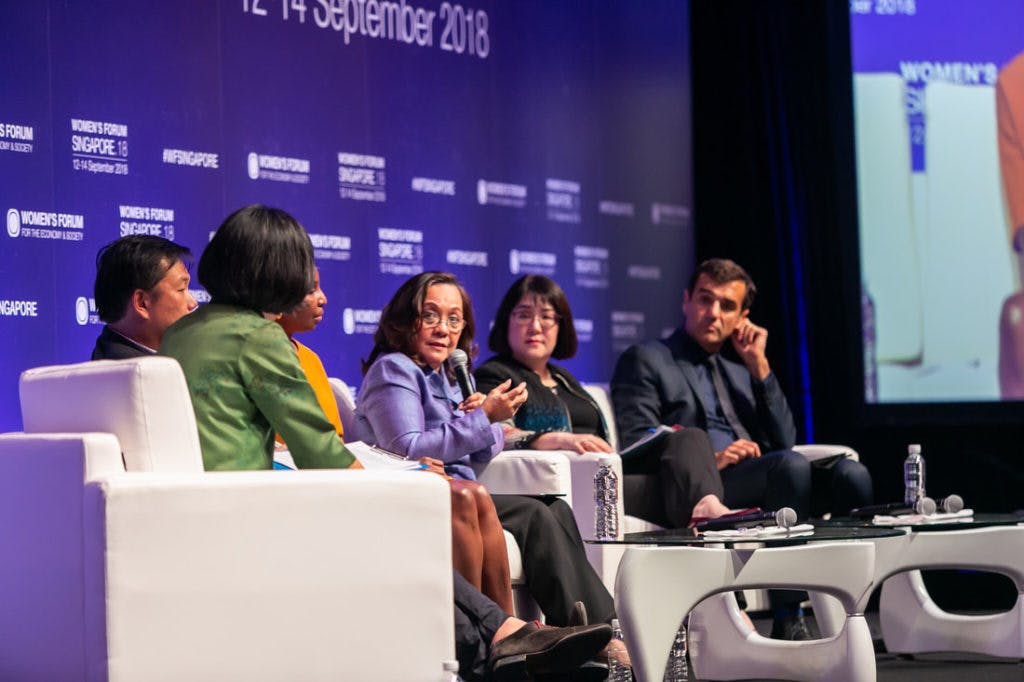BUSINESS EDUCATION FOR WOMEN'S LEADERSHIP
Posted by James Goh
As of May 2018, only 5% of Fortune 500 CEOs are women (See Fortune’s MPW List for 2018 here).
To explore this phenomenon from an education standpoint, the recent Women’s Forum Singapore 2018 brought together a strong panel of representatives from university institutions such as Evelyne Kuoh, President of HEC au Feminin, Ilian Mihov, Dean of INSEAD, Kevyn Yong, Associate Dean of Execution Education from ESSEC Business School APAC; and also from McKinsey & Company – Diaan-Yi Lin, Managing Partner and Zenaida C. Maglaya, Undersecretary from Department of Trade and Industry of the Republic of the Philippines.
The panelists started by sharing a few factors behind this under-representation of females in corporate CEO roles. Firstly, it is about the roles that women play within the organisations.
As females are overrepresented in clerical and support or functional roles without significant P&L responsibilities, they don’t gain exposure to career pathways to CEO positions as readily as their male counterparts do. Without the exposure to large line management responsibilities and business P&L responsibilities, women trend towards roles as CHRO, CMO or CFO in the few instances (all still admirable and influential leadership posts), but are not filling the ‘top of the funnel’ for CEO succession specifically.
The other reason is the number of women in senior management roles which has a direct impact on the probability for more women CEOs. In Japan, less than 1% of senior managers are women.
In India, it is 5%, and in Philippines, Australia and Singapore, the number increases to 20% to 30%. There are unique societal norms that tend to impact women, meaning there’s a variety of different factors causing this trend in each Nation or sector.
For example, women tend to be less prominent in industries like ICT and STEM, as educational institutions have not prepared a pipeline of females in these sectors since kindergarten, and consequently, if they do arrive as qualified professionals in these sectors, such high-growth business environment are typically less supportive to women’s motivators and lifestyle considerations.
Lastly, women themselves also play a part. There are many highly talented women who choose to opt out from senior roles due to personal lifestyle choices which they don’t believe they can balance with the demands of a senior role, or because they simply lack the confidence to take on CEO roles.
It is also highlighted that women tend to hold back from relocating to other countries due to family priorities, and this indirectly affected their business understanding, exposure, worldview and vision, which are all essential competencies for a successful CEO. Also, women are very good at negotiating and supporting others who work for them, but not for themselves.
Finally, as a society, we can start educating our next generation from early childhood to reduce any unconscious biases setting in from a young age, and increasing their awareness of gender equality.
As a HR practitioner, I agree that there is much more that can be done within the organisations to increase the awareness of unconscious biases and rethink our management and leadership decisions so that women can be given more equal opportunities.
This remain an important topic today, as equality in society should be represented in the workplace, and vice versa, creating a balance of perspectives and therefore more sustainability for our businesses as we reach the next industrial revolution.
Conferences such as the Women’s Forum Singapore 2018 are fantastic for opening dialogue amongst key leaders of various sectors (like governmental, large corporations, social enterprises, entertainment), demonstrating the business case for equal gender access, and networking highly capable people with the latest thinking and collaborations.
And yet this is only the tip of the iceberg – the real change happens in our organisations, and leaders have to be committed to this agenda.
If you're interested in learning more about how BOLDLY can help your organisation, we invite you to explore our website or write to us at connect@boldly.app.
About the Author:
As a Management Consultant by profession, James Goh thrive on helping others, and co-creating with organisations in areas such as leadership, training and development, talent management, innovation and organisational strategy. Previously involved in the development and implementation of a customized HR Tech product, he's enthusiastic about trying new things, and in cherish the process of creating value for businesses and individuals through his work.
Previously an organisational behaviour researcher, a public speaker, and an occasional consultant to several private institutions on leadership framework, organizational processes and change management, he is driven to constantly challenge himself to do better, while at the same time committed to continue putting a smile on himself and others through impactful work.
He is also an active community youth leader, and served preciously as the Chairman of the PAYM Central Youth Council, and a council member with the National Youth Council.He is currently a District Councillor with the Central District Community Development Council, and a Panel Member with the LTA Active Mobility Advisory Panel.
He is always happy to connect, and get to know people who share the same conviction, passion and drive in his area of expertise.






